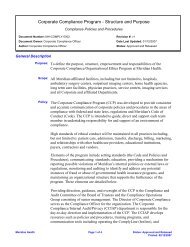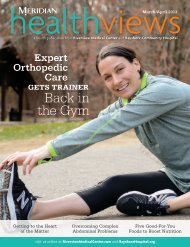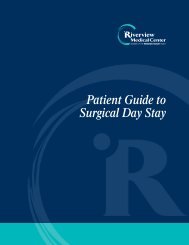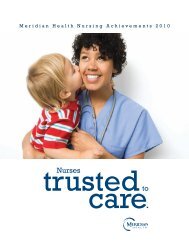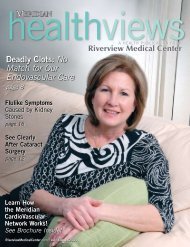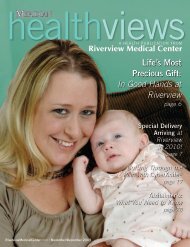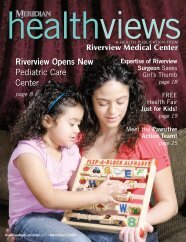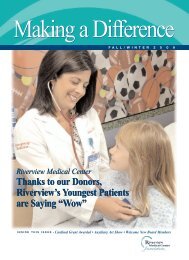Download the November/December 2012 Issue - Bayshore ...
Download the November/December 2012 Issue - Bayshore ...
Download the November/December 2012 Issue - Bayshore ...
Create successful ePaper yourself
Turn your PDF publications into a flip-book with our unique Google optimized e-Paper software.
Take a Closer Look<br />
at Your Eye Health<br />
Diseases such as glaucoma, cataracts, diabetic eye disease, and<br />
age-related macular degeneration can rob you of your sight.<br />
But you may not notice changes in your vision right away.<br />
Thankfully, <strong>the</strong>re are ways to detect <strong>the</strong>se diseases early, when <strong>the</strong>y’re<br />
most treatable.<br />
Eye Exam May See Problems Before You Do<br />
“A dilated eye exam — in which <strong>the</strong> pupil is widened with drops to<br />
allow a closer look at <strong>the</strong> eye — can help your eye doctor find disease<br />
at an early stage,” says Walter Kahn, M.D., FACS, ophthalmologist with<br />
Riverview Medical Center. If you’re younger than age 60, don’t have<br />
any special risk factors, and aren’t having vision problems, see <strong>the</strong> eye<br />
doctor for a thorough exam about every two to four years.<br />
If you are age 60 or older, or are at risk for any of <strong>the</strong>se causes of<br />
blindness, you may need more frequent exams:<br />
• Glaucoma can strike anyone, but African-Americans older than<br />
40, anyone older than 60, and people with a family history of <strong>the</strong><br />
disease are most at risk. They should get <strong>the</strong> exam at least once<br />
every two years.<br />
• Diabetic eye disease can affect people with diabetes at any age.<br />
Go for an exam once every year.<br />
• Age-related macular degeneration is more common in people who<br />
are older than 60. However, it can occur at any age. Women are at<br />
higher risk than men, as are those who are Caucasian, are obese,<br />
smoke, or have a family history of <strong>the</strong> disease. Anyone older than<br />
60 should have <strong>the</strong> exam every two years.<br />
Healthy Lifestyle, Healthy Eyes<br />
“In general, <strong>the</strong> healthier you are, <strong>the</strong> greater your odds of avoiding<br />
eye problems,” says Dr. Kahn. These strategies can help:<br />
• Eat foods rich in vitamins A, C, and E. Examples include oranges and<br />
strawberries (vitamin C), almonds (vitamin E), and carrots (vitamin A).<br />
• Exercise regularly.<br />
• Keep your blood pressure under control.<br />
• Avoid smoking.<br />
• Wear protective eyewear when working with strong chemicals such<br />
as oven cleaner, operating motorized equipment, or playing sports<br />
such as racquetball or basketball.<br />
• Protect your eyes from ultraviolet (UV) light by wearing sunglasses<br />
and a wide-brimmed hat when in <strong>the</strong> sun. Choose sunglasses that<br />
block at least 99 percent of UV rays.<br />
See More Clearly<br />
Walter J. Kahn, M.D., FACS<br />
Board certified in Ophthalmology<br />
Red Bank • 732-741-0858<br />
The Latest in LASIK<br />
Technology<br />
The Vision Correction Center<br />
at Riverview Medical Center is<br />
<strong>the</strong> only hospital in Monmouth<br />
and Ocean counties to offer <strong>the</strong><br />
latest 100 percent blade-free<br />
LASIK technology available,<br />
<strong>the</strong> IntraLase iFS (femtosecond)<br />
laser. The iFS laser is a highly<br />
sophisticated way to prepare <strong>the</strong><br />
eye for LASIK, without a blade<br />
ever touching it.<br />
“The LASIK procedure has never<br />
been safer or more precise,<br />
thanks to <strong>the</strong> blade-free IntraLase<br />
method,” says Walter Kahn,<br />
M.D., FACS, ophthalmologist<br />
with Riverview Medical Center.<br />
“I’m proud to offer our patients<br />
this advantage close to home at<br />
Riverview.”<br />
Considering LASIK? Learn more about <strong>the</strong> latest techniques offered at Riverview Medical Center.<br />
Call <strong>the</strong> Vision Correction Center at 732-530-2295 or visit RiverviewMedicalCenter.com.<br />
Healthy Highlights<br />
Meridian HealthViews • <strong>November</strong>/<strong>December</strong> <strong>2012</strong><br />
27



